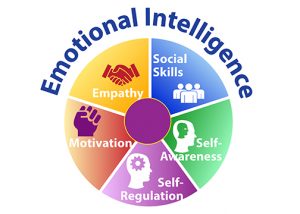Emotional Intelligence and Academic Performance:
Why Emotionally Intelligent Children Perform Better Academically

Emotional intelligence can be defined as ‘the ability to perceive, understand and manage one’s emotions and relationships.’ Developing emotional intelligence is a fundamental part of the development process – closely linked to a variety of important outcomes in children and adults. Many schools, parents and cultures continue to undermine the importance of emotional intelligence, prioritising the academic curriculum over emotional education. Our emotions are important when it comes to navigating life as a whole, helping us to grow, to develop and to learn; but far too often, children are taught to ignore them. Thomas Scheff, a sociologist at the University of Santa Barbara, highlights the dangers of ineffective education when it comes to emotional intelligence. Specialising in the destructive effects of emotion, and more specifically shame; Scheff highlights the risks posed by the suggestion that we should hide our emotions behind one another – especially for males, who tend to disguise more negative emotions behind anger, aggression and violence. But does our emotional intelligence play a role in academic performance?
Before we can consider the question any further, it’s beneficial to look into the key components of emotional intelligence a little more closely. In 1990, psychologists John Mayer and Peter Salovey first coined the term emotional intelligence. They proposed that emotional intelligence was a cognitive ability, separate from but closely associated with cognitive intelligence. They were the first to introduce the four-branch concept of emotional intelligence, outlining that true emotional intelligence involves the possession of self-awareness, self-management, social awareness and relationship management. According to Mayer and Salovey, emotionally intelligent individuals must be able to identify their emotions on a non-verbal level, to use their emotions in a way that guides cognitive thinking, to understand the information received from emotions and the subsequent actions that they are often responsible for, and to regulate their emotions for the benefit of personal growth and development as well as the common good. In 1995, Daniel Goleman took this concept of emotional intelligence a step further. Goleman argued that the pre-existing definitions of intelligence required reconsideration, highlighting that while IQ was still important, intellect alone could not be considered a reliable predictor of an individual’s ability to perceive emotion. Goleman expanded Mayer and Salovey’s four-branch theory of emotional intelligence into a five-branch theory, incorporating what he considered to be the five essential components of emotional intelligence – or the EQ. Goleman defines the five key components of emotional intelligence as a well-developed emotional self-awareness, strong self-regulation skills, a sense of enjoyment and motivation when it comes to learning, an ability to empathise and understand the emotions of others, and well-rounded social skills.


So, does emotional intelligence influence academic performance? Well, yes! Goleman found that bullying, disciplinary problems, violence and drug abuse were all significantly reduced in schools with a high EQ – he found that solid emotional intelligence skills were directly related to not only an improvement in behaviour, but academic performance as well! While Mayer and Goleman were the first to highlight the importance of emotional intelligence when it comes to overall intelligence and educational attainment, they were certainly not the last. Over the years, psychologists have continued to investigate the effects of emotional intelligence on academic achievement and have time and time again come to find a positive correlation. In 2018, a study exploring the effects of universal school-based social and emotional learning programs on academic achievement and improvement found that social and emotional learning programs had a positive effect on reading, mathematics and science. Furthermore, in 2020, the American Psychological Association published a comprehensive meta-analysis study investigating the effects of higher emotional intelligence on academic success. Researchers analysed data from more than 160 studies published between 1998 and 2019, spanning 27 countries and representing 42,000 students – ranging from those in elementary school to college. The study found that those students with a higher level of emotional intelligence achieved higher grades and obtained better achievement test scores than those students with lower emotional intelligence levels.
So, we know that emotional intelligence influences academic performance, but why?
Well, there are a number of reasons. The first, and quite possibly the most obvious explanation is that emotionally intelligent individuals will find themselves better equipped to deal with the more negative emotions that accompany the challenges and common stressors occurring during the learning process. For instance, children with higher emotional intelligence levels may find it easier when it comes to overcoming stress during an exam, avoiding prolonged focus on the prospect of a bad grade or disappointing result and maintaining focus on a subject despite a lack of interest – subsequently performing better than those with lower emotional intelligence levels. Furthermore, children with higher emotional intelligence will naturally be more self-aware when it comes to experiencing negative emotions such as anxiety, and as a result, will be more equipped to recognise the importance of seeking help from a parent or teacher should they find themselves struggling. When it comes to education, there is an obvious link between Goleman’s third motivational component of emotional intelligence and academic success. Learning of course stimulates curiosity, and the ability to engage in the process of acquiring new knowledge has been found to promote strong feelings of satisfaction and enjoyment in those children with a higher EQ. Emotional intelligence is also incredibly important when it comes to the relationships that children form throughout their development. Emotionally intelligent children have been shown to display more advanced interpersonal skills, enabling them to foster and maintain more positive relationships with their peers and their teachers throughout their time in education. As a result, these children find themselves in a supportive learning environment in which they can develop and grow while excelling academically.
When we take a moment to really consider the fundamentals of good emotional intelligence, it’s no surprise that it can play such an influential role in a child’s academic success!